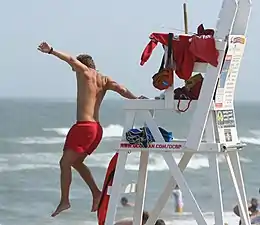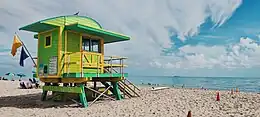Lifeguard tower
Lifeguard towers are used at recreational beaches or public swimming pools to watch and swimmers in order to prevent drownings and other dangers. Lifeguards scan for trouble from the structures, which vary from beach bungalows by the ocean to poolside towers. Lifeguard towers are also used to spot sharks and other threats.[1]


The towers have featured in television shows including Baywatch. Their construction is sometimes paid for with fundraisers,[2] and their operation and staffing is subject to funding availability.[3] Design contests have challenged architects to offer their visions of the structures.
Swimming Pool Lifeguard Towers
Different from the regular beach lifeguard towers, a swimming pool lifeguard tower is generally smaller in size. It can be as simple as a heightened chair or as complex as a structure with a built-in ladder and a platform that edges over the pool. Entering the lifeguard tower is a routine part of a lifeguard's job, but maintaining constant surveillance and safely entering the tower is key [4]
In the arts

Architect Frank Gehry designed a lifeguard tower into a house as part of a remodel in Venice Beach, California in 1985.[5]
In 1988 a gallery commissioned "14 of the world's best-known architects to design lifeguard towers, those familiar fixtures that protect lifeguards from the elements and provide landmarks to help swimmers remember where they put their towels." The designers included Stanley Tigerman, Michael Graves, Richard Meier, Charles Moore, Aldo Rossi, Hans Hollein, Antoine Predock and Cesar Pelli and were given specifications including 360-degree visibility, vandal-proofing and other requirements as well as a hypothetical budget of $17,000 for their designs.[6] The "superstar" West Coast architects were part of an exhibit of drawings and models of proposals for designer lifeguard towers in 1990.[7]
A similar contest was held in 2004 in Miami Beach with 25 local architects. The contest was organized by Jeremy Calleros Gauger, a graduate student at the University of Miami School of Architecture, and the designs were displayed at the Ocean Beach Auditorium. The winners announced were a functional cube with louvers and a modified surfboard design. A "striking" design called Plank earned an honorable because "there had to be space for a lifeguard to change out of a wet bathing suit."[8][9]
In popular culture

A May 21, 2006 Family Guy episode featured Stewie trying to destroy his rival by blowing up the lifeguard tower.[10]
References
- "At around 11 a.m., water safety officers from the Kekaha lifeguard tower had confirmed the sighting. They spotted the reported whale slowly drifting some 300 yards off the point." http://www.kauaiworld.com/articles/2009/02/10/news/kauai_news/doc499129ab3c873126071696.txt
- Gina McGalliard Bash for new DM lifeguard tower this Saturday Feb 5, 2009 http://www.delmartimes.net/news/253516-bash-for-new-dm-lifeguard-tower-this-saturday%5B%5D
- Lifeguard tower to close as Palm Beach County budget cuts reach beach: Tower will be left empty as lifeguards join efforts to stretch public services. September 30, 2007 South Florida Sun-Sentinel (Fort Lauderdale, FL)
- Los Angeles City Pre-Academy Training Participant Manual. Los Angeles City: CIty of Los Angeles. 2014. pp. 8–10.
- Joseph Giovannini In L.A., the Unconventional is Often the Rule of Thumb Jan 6, 1985, New York Times News Service, Chicago Tribune (preview)
- Patricia Leigh Brown Cowabunga! Lifeguard Towers as Art July 14, 1988 New York Times
- To The Rescue- Architects offer the world a better (well, different lifeguard tower) March 7, 1990 St. Louis Post-Dispatch page 1D (preview)
- Linda Lee CURRENTS: DESIGN; In Miami, a Contest for Best Lifeguard Roost December 2, 2004 New York Times
- A slide of one of the lifeguard tower designs from the Miami competition New York Times website
- Stewie B. Goode/Bango Was His Name O/Stu & Stewie's Excellent Adventure Episode synopsis New York Times